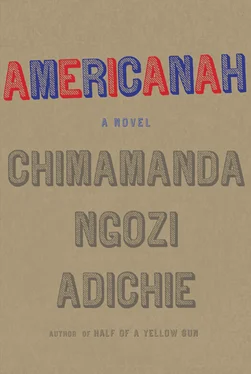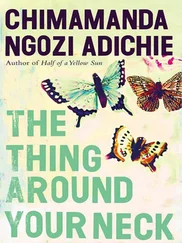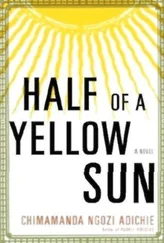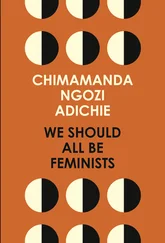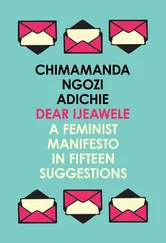Yemi had studied English at university and Obinze asked him what books he liked, keen to talk about something interesting at last, but he soon realized that, for Yemi, a book did not qualify as literature unless it had polysyllabic words and incomprehensible passages.
“The problem is that the novel is too simple, the man does not even use any big words,” Yemi said.
It saddened Obinze that Yemi was so poorly educated and did not know that he was poorly educated. It made him want to be a teacher. He imagined himself standing in front of a class full of Yemis, teaching. It would suit him, the teaching life, as it had suited his mother. He often imagined other things he could have done, or that he could still do: teach in a university, edit a newspaper, coach professional table tennis.
“I don’t know what your line of business is, sir, but I am always looking for a better job. I’m completing my master’s now,” Yemi said, in the manner of the true Lagosian who was always hustling, eyes eternally alert to the brighter and the better; Obinze gave him his card before going back to find Kosi.
“I was wondering where you were,” she said.
“Sorry, I ran into somebody,” Obinze said. He reached into his pocket to touch his BlackBerry. Kosi was asking if he wanted more food. He didn’t. He wanted to go home. A rash eagerness had overcome him, to go into his study and reply to Ifemelu’s e-mail, something he had unconsciously been composing in his mind. If she was considering coming back to Nigeria, then it meant she was no longer with the black American. But she might be bringing him with her; she was after all the kind of woman who would make a man easily uproot his life, the kind who, because she did not expect or ask for certainty, made a certain kind of sureness become possible. When she held his hand during their campus days, she would squeeze until both palms became slick with sweat, and she would say, teasing, “Just in case this is the last time we hold hands, let’s really hold hands. Because a motorcycle or a car can kill us now, or I might see the real man of my dreams down the street and leave you or you might see the real woman of your dreams and leave me.” Perhaps the black American would come back to Nigeria, too, clinging on to her. Still, he sensed, from the e-mail, that she was single. He brought out his BlackBerry to calculate the American time when it had been sent. Early afternoon. Her sentences had a hasty quality; he wondered what she had been doing then. And he wondered what else Ranyinudo had told her about him.
On the Saturday in December when he ran into Ranyinudo at the Palms mall, he was carrying Buchi in one arm, waiting at the entrance for Gabriel to bring the car around, and holding a bag with Buchi’s biscuits in the other hand. “The Zed!” Ranyinudo called out. In secondary school she had been the bubbly tomboy, very tall and skinny and straightforward, not armed with the mysteriousness of girls. The boys had all liked her but never chased her, and they fondly called her Leave Me in Peace, because of how often she would say, whenever asked about her unusual name, “Yes, it is an Igbo name and it means ‘leave us in peace,’ so you leave me in peace!” He was surprised at how chic she looked now, and how different, with her short spiky hair and tight jeans, her body full and curvy.
“The Zed — The Zed! Longest time! You don’t ask about us again. Is this your daughter? Oh, bless! The other day I was with one my friends, Dele. You know Dele from Hale Bank? He said you own that building near the Ace office in Banana Island? Congratulations. You’ve really done well o. And Dele said you are so humble.”
He had been uncomfortable, with her overdone fussing, the deference that seeped subtly from her pores. He was, in her eyes, no longer The Zed from secondary school, and the stories of his wealth made her assume he had changed more than he possibly could have. People often told him how humble he was, but they did not mean real humility, it was merely that he did not flaunt his membership in the wealthy club, did not exercise the rights it brought — to be rude, to be inconsiderate, to be greeted rather than to greet — and because so many others like him exercised those rights, his choices were interpreted as humility. He did not boast, either, or speak about the things he owned, which made people assume he owned much more than he did. Even his closest friend, Okwudiba, often told him how humble he was, and it irked him slightly, because he wished Okwudiba would see that to call him humble was to make rudeness normal. Besides, humility had always seemed to him a specious thing, invented for the comfort of others; you were praised for humility by people because you did not make them feel any more lacking than they already did. It was honesty that he valued; he had always wished himself to be truly honest, and always feared that he was not.
In the car on the way home from Chief’s party, Kosi said, “Darling, you must be hungry. You ate only that spring roll?”
“And suya.”
“You need to eat. Thank God I asked Marie to cook,” she said, and added, giggling, “Me, I should have respected myself and left those snails alone! I think I ate up to ten. They were so nice and peppery.”
Obinze laughed, vaguely bored, but happy that she was happy.

MARIE WAS SLIGHT, and Obinze was not sure whether she was timid or whether her halting English made her seem so. She had been with them only a month. The last housegirl, brought by a relative of Gabriel’s, was thickset and had arrived clutching a duffel bag. He was not there when Kosi looked through it — she did that routinely with all domestic help because she wanted to know what was being brought into her home — but he came out when he heard Kosi shouting, in that impatient, shrill manner she put on with domestic help to command authority, to ward off disrespect. The girl’s bag was on the floor, open, clothing fluffing out. Kosi stood beside it, holding up, at the tips of her fingers, a packet of condoms.
“What is this for? Eh? You came to my house to be a prostitute?”
The girl looked down at first, silent, then she looked Kosi in the face and said quietly, “In my last job, my madam’s husband was always forcing me.”
Kosi’s eyes bulged. She moved forward for a moment, as though to attack the girl in some way, and then stopped.
“Please carry your bag and go now-now,” she said.
The girl shifted, looking a little surprised, and then she picked up her bag and turned to the door. After she left, Kosi said, “Can you believe the nonsense, darling? She came here with condoms and she actually opened her mouth to say that rubbish. Can you believe it?”
“Her former employer raped her so she decided to protect herself this time,” Obinze said.
Kosi stared at him. “You feel sorry for her. You don’t know these housegirls. How can you feel sorry for her?”
He wanted to ask, How can you not? But the tentative fear in her eyes silenced him. Her insecurity, so great and so ordinary, silenced him. She was worried about a housegirl whom it would never even occur to him to seduce. Lagos could do this to a woman married to a young and wealthy man; he knew how easy it was to slip into paranoia about housegirls, about secretaries, about Lagos Girls , those sophisticated monsters of glamour who swallowed husbands whole, slithering them down their jeweled throats. Still, he wished Kosi feared less, conformed less.
Some years ago, he had told her about an attractive banker who had come to his office to talk to him about opening an account, a young woman wearing a fitted shirt with an extra button undone, trying to hide the desperation in her eyes. “Darling, your secretary should not let any of these bank marketing girls come into your office!” Kosi had said, as though she seemed no longer to see him, Obinze, and instead saw blurred figures, classic types: a wealthy man, a female banker who had been given a target deposit amount, an easy exchange. Kosi expected him to cheat, and her concern was to minimize the possibilities he might have. “Kosi, nothing can happen unless I want it to. I will never want it to,” he had said, in what was both a reassurance and a rebuke.
Читать дальше
